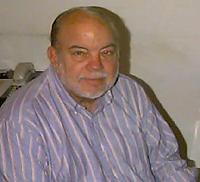Recently by Gary North: What I Should Have Said to Meryl Streep
Bill Marina (1937—2009) died of a heart attack on the morning of July 7. The libertarian movement has lost one of its most gifted historians. He was retired from teaching, but he was the least retired retired professor I have ever known. He was working on half a dozen major projects when he died.
My main regret is that he did not write more books. But he wrote essays and short items constantly, including one posted a couple of hours before he died: an essay on Israeli “sovereignty” (his quotation marks) and American power.
He was the author of the standard college-level textbook on the history of Florida. That was his only book that ever sold well. He was a non-interventionist in his view of American foreign policy. He began his academic career with a 1968 Ph.D. dissertation: Opponents of Empire: An Interpretation of American Anti-Imperialism, 1898—1921. Sadly, it was never published. With the Web, I hope the actual dissertation will be. He had recently bought a book-scanning machine that will create PDFs. He wanted to re-publish classic books and post them on the Web.
He never deviated from his opposition to empire. He took shots at it whenever he could find an outlet. He is the only person I ever knew who thought George Washington was a closet imperialist. He wrote this in a LRC article in 2007.
Much has been made by some opponents of Interventionism, in suggesting that we go back to Washington’s Farewell Address, of “no entangling alliances,” as a model for the country today. I believe this a misreading of the Washington-Alexander Hamilton view, that this really meant an open door to unilateral intervention.
As exhibit one, I would offer Washington’s aid to the French Creoles in Haiti in 1792, in an effort to thwart the Blacks revolting there. Here was America’s first effort at “foreign aid,” some $726,000 at a time when that was real money! As a southerner and slaveholder, Washington was concerned that Black revolt would carry over into the United States.
 Bill Marina was hard-core.
Bill Marina was hard-core.
He wrote a series of articles three decades ago on the militia in the American Revolution. The local militias, not Washington’s centralized conventional army, held the British in check inside coastal cities. He wrote this in 1975:
The regular American army, as well as segments of a rag-tag militia, accepted the surrender at Yorktown. The existence of that army should never be allowed to obscure the large reason for the British defeat which was that they could never control, let alone win over, a population of armed militia that was the foundation of support for the American government. The British military historian Eric Robson acknowledged: “Restricted to little more than the ground they stood on, the British increasingly found subsistence a matter of considerable difficulty.” That was not the result of Washington’s valiant little army camped at Valley Forge or for so many years across the Hudson from the British in New York City, but rather the American guerrilla militia that from local homes and farms made life in the British Army a living hell. Every small detachment was legitimate prey for the Americans. Historians will never know how many of these small skirmishes there were, but only glimpse them all over the landscape, realizing that they form the real reason for the low British morale and eventual defeat.
I earned a Ph.D. in American history, with a concentration in colonial America. Before I read Marina, I had never heard this story. It is still ignored in the textbooks. This was the origin of the Second Amendment.
I knew nothing of his heart condition, but I was concerned that he would not finish his great book, a detailed analysis of the Kennedy assassination. He was the only history professor who was in Dealey Plaza at the moment it happened. He was on the faculty of the University of Texas, Arlington, at the time. He spent over 40 years studying the event, and having his students study it. He was convinced that Oswald acted alone.
His death is unnerving for me, because a week ago, I wrote an article about a letter I sent to him on how to market his book, when he finished it.
In late April, I wrote an article just for him, to encourage him to finish. I wrote this:
It is steady as you go. It is line upon line. It is cumulative. If you are working on several projects, be sure that you have a schedule to complete each one in sequence. Stick to your schedule. If you don’t, you will probably die with all of them incomplete and fragmentary.
So, you must prioritize. Be in a position to reschedule your time, so that if you ever find out you are terminal, you can complete the main one. This means that you must steadily complete sections of the main one. Get them finished. Don’t assume that you have 20 years.
My worst fear has been realized.
I will miss him personally. I will miss his intellect. I am happy that just a few days ago, I asked him for recommendations of books on Confucius. He was also an expert in Chinese history. He sent me three suggestions.
I should have asked for a lot more suggestions over the years.
July 8, 2009
Gary North [send him mail] is the author of Mises on Money. Visit http://www.garynorth.com. He is also the author of a free 20-volume series, An Economic Commentary on the Bible.
Copyright © 2009 Gary North



